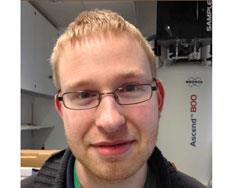Former apprentice, Christopher uses NMR to identify the chemical structure of new and unknown compounds to support the development of new medicines
What is a scientific associate?
As an NMR spectroscopist I work in an analytical group within a pharmaceutical research company. The role involves identifying and determining the structures of compounds made by chemists as well as determining the quality of samples used in testing. NMR spectroscopy is also used in many other fields as a tool for identification. I became a full time scientific associate working within the NMR spectroscopy group this summer, after completing my apprenticeship. This is the same group that I had spent the last year of my apprenticeship in, undertaking a final year university project looking into antibody binding by NMR spectroscopy.
What do you do in your job?
My day to day activities involve maintaining the NMR facilities and supporting the chemists at work by telling them what the chemical structure of their compounds are. I’m also involved in the running and issuing of ‘Certificates of Purity’s’, which are done to obtain the purity of all samples before they are used in testing. I determine whether a sample is pure or not by running a number of different analytical experiments, including NMR assignments, orthogonal LC-MS, thermogravimetric analysis and ion chromatography.

During my apprenticeship, I was given the opportunity to spend two months working within Novartis’s headquarters in Basel, Switzerland. I used state of the art NMR equipment to learn some cutting edge techniques that I could then bring back and implement in our UK based research.
What do you enjoy most about your job?
I enjoy using NMR spectroscopy to identify the structure of an unknown compound; it’s really satisfying to know that without the use of NMR this couldn’t be easily worked out. I also enjoy being at the forefront of research, being involved with lots of projects that are at varying stages within research, and using a variety of different methods to help these projects.
What attracted you to becoming a scientific associate?
I have always been interested in chemistry and the work of pharmaceutical companies, and being able to study towards a degree and gain experience in the lab seemed like the perfect opportunity for me. I chose to work within NMR spectroscopy as I am very analytically minded, methodical and logical, which are the key attributes needed to work within NMR.
How did you get into your job?
I joined Novartis in 2008 as an apprentice, as soon as I had finished my A-Levels. As an apprentice, which is a five year scheme, four days a week were spent working in research laboratories. I rotated through different groups every four months and gained some great experience in the medicinal chemistry groups, large scale chemistry, computational chemistry, analytical chemistry and metabolism groups. Also one day a week was spent at the University of Greenwich, studying first towards a HNC chemistry qualification which I passed with distinction and then a Chemistry BSc which I obtained a 1st for this year.
What are the opportunities for career progression?
A scientific associate role is usually a position held by new graduates and people starting out in their career as a research scientist. General career progression then leads on to a position as a scientist or investigator; these positions hold more responsibility and you are in charge of running and progressing the research projects within the pharmaceutical companies. My personal aims include gaining a PhD, as this will allow me to gain more experience within the NMR field and develop into a better spectroscopist.
What advice would you give for people wishing to enter your career area?
To work hard and follow what interests you. Gain as much experience as possible; if there is a chance to work within or alongside a research group take the opportunity and make the most of the contact with other people within the field. If you are thinking of entering this area you need to be methodical and logical; patience is important as the answer will not always be obvious. The ability to think about the problem in hand and work out how best to answer it is also really important. Whilst a science degree is normally an essential part of working within a research environment there are various routes available to gain your degree, such as studying as an apprentice.
First published 2015













